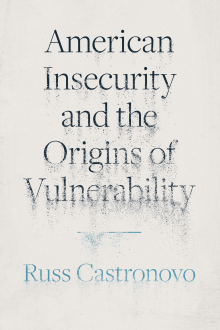
American Insecurity and the Origins of Vulnerability
For more than three centuries, Americans have pursued strategies of security that routinely make them feel vulnerable, unsafe, and insecure. American Insecurity and the Origins of Vulnerability probes this paradox by examining American attachments to the terror of the sublime, the fear of uncertainty, and the anxieties produced by unending racial threat.
Challenging conventional approaches that leave questions of security to policy experts, Russ Castronovo turns to literature, philosophy, and political theory to show how security provides an organizing principle for collective life in ways that both enhance freedom and limit it. His incisive critique ranges from frontier violence and white racial anxiety to insurgent Black print culture and other forms of early American terror, uncovering the hidden logic of insecurity that structures modern approaches to national defense, counterterrorism, cybersecurity, surveillance, and privacy. Drawing on examples from fiction, journalism, tracts, and pamphlets, Castronovo uncovers the deep affective attachments that Americans have had since the founding to the sources of fear and insecurity that make them feel unsafe.
Timely and urgent, American Insecurity and the Origins of Vulnerability sheds critical light on how and why the fundamental political desire for security promotes unease alongside assurance and fixates on risk and danger while clamoring for safety.
Russ Castronovo

Russ Castronovo is Tom Paine Professor of English and Director of the Center for the Humanities at UW-Madison where he teaches courses on American literature, political theory, and popular culture. His most recent book, American Insecurity and the Origins of Vulnerability is forthcoming later this year from Princeton University Press. He is also the author and editor of 9 other books, including Propaganda 1776: Secrets, Leaks, and Revolutionary Communications in Early America; Beautiful Democracy: Aesthetics and the Anarchy of Global Culture; Necro Citizenship: Death, Eroticism, and the Public Sphere in the Nineteenth-Century-United States; Fathering the Nation: American Genealogies of Slavery and Freedom. In addition to publishing scores of academic articles, he writes for public audiences more broadly at outlets such as Public Books, Public Seminar, the Capitol Times, and the Wisconsin State Journal. He is the recipient of the Chancellor’s Distinguished Teaching Award and the University of Wisconsin system-wide teaching award.
